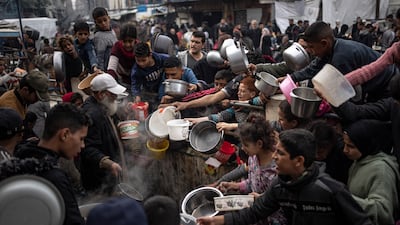Live updates: Follow the latest news on Israel-Gaza
Starvation and disease are being used as a weapon of war on a scale never seen before, Palestine’s senior diplomat in the UK said, as he condemned Britain and US for not doing enough to prevent what he called Israel’s campaign of genocide.
Dr Husam Zomlot, ambassador to the Palestinian mission in the UK, blamed Israel for restricting the entry of humanitarian aid lorries into Gaza, a claim previously made by international aid organisations.
“Food assistance is only trickling in because [of] Israel's blockage and preventing access under the pretext of security,” he said at a press conference in London.
He warned “shocking” numbers of people could die of illness such as cancer or kidney failure, due to a lack of medical care. “It will only get worse during the cold winter months,” he said.
"Israel’s bombardment and siege of Gaza left Palestinians with no choice but to die or leave their lands," he said. “An entire population has been sentenced to death – or mass expulsion."
He cited figures from the World Health Organisation showing more than 90 per cent of Gaza’s 2.2 million people were facing hunger and malnutrition, with the situation expected to deteriorate during winter. More than 24,000 people have been killed, "the vast majority" of them women and children, which equates to 850 deaths a day since the war began, Dr Zomlot said.
Displaced people have no access to clean water and overcrowded shelters have become a breeding ground for infectious diseases such as cholera and respiratory illnesses.
“These are deliberate policies of starvation and disease used as a weapon of war,” he said.
He called for an immediate ceasefire and criticised the failure of the international community to enable it.
“Despite this unprecedented man-made humanitarian disaster, we see no serious efforts by the most important international actors to bring about an immediate, sustainable, comprehensive and permanent ceasefire,” he said.
The US and UK were not doing enough to implement resolutions that would bring about a two-state solution for Israel and Palestine, he said.
"Either we are serious about these resolutions or the whole foundation of the international system is hollowed out, simply hollowed out," he said. "This is the biggest stress test of the international order since its founding in 1940."
The UK’s position on the Israel-Gaza war lacked “consistency” and revealed a “double standard”, he said.
He highlighted Prime Minister Rishi Sunak’s criticism of South Africa’s case against Israel at the International Court of Justice, while Foreign Secretary Lord Cameron refused to comment on whether Israel had broken international law.
“This is the selectivity, this is the hypocrisy,” he said.
He called on British MPs to take heed of the protests in London – calling for a ceasefire in Gaza and an end to the Israeli occupation of the Palestine – comparing the rallies to the South Africa anti-apartheid campaign, which began in the UK with the Boycott Movement of 1959.
“It is an inspiring, empowering and strategic development. It is a scene that reminds us of the anti-apartheid movement,” he said of the near-weekly marches that have drawn hundreds of thousands to central London.
“It is often the people who actually start a movement who side with justice. It is often the people, not politicians, who actually create dynamics, power, pressure to change the course of history.
100 days of Israel Gaza war - in pictures
Dr Zomlot praised South Africa’s case at the ICJ in The Hague, saying it was a step towards accountability.
He hoped the ICJ would introduce provisional measures to bring an immediate end to Israel’s military campaign in Gaza, “stopping the carnage because nobody else did”.
Longer proceedings looking into whether Israel intended to commit genocide in Gaza were a “major step in the right direction”.
“Accountability is key,” he said. "We have to make sure that what has taken place over the past 100 days will never, ever happen again."
There was “no way” the ICJ would rule in Israel’s favour, Dr Zomlot said.
“There is no possible legal way. This was the first time in history that the genocide has been recorded by the people who were executed, transmitted live all over the world."
“There is no way Israel could hide its intent in committing genocide."
The ICJ ruling will be a “defining moment” for international order. Dr Zomlot said: “Should it fail, I think it would have failed itself, its mandate and the entire rules-based order."





















